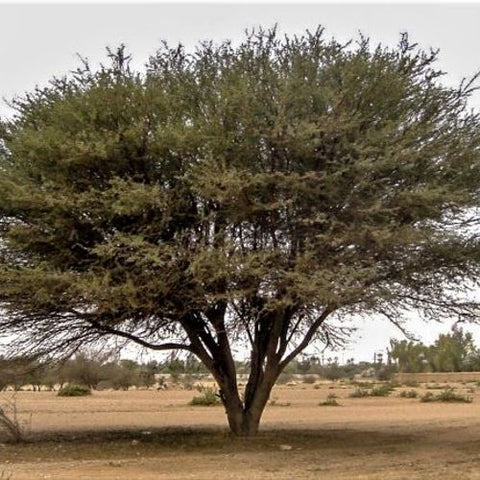Egyptian Mimosa, also known as Bagaruwa or Acacia arabica Willd. (Mimosaceae) , is a flowering tree native to Africa, the Middle East, and the Indian subcontinent. This plant has a rich history of use in traditional medicine and is known for its various medicinal properties.
Every part of the plant is used for medicinal purposes, including the treatment of conditions such as bronchitis, piles, urethral discharges, and as a liver tonic. Its gum has been used for diarrhea, urinary/vaginal and uterine discharges, sore throat, diabetes mellitus, and healing of fractures.
The Egyptian Mimosa plays a crucial role in strengthening the immune system and maintaining overall health and wellness. We will be discussing some of those in this article.
Egyptian Mimosa in Womb Healing, Vaginal Infections and Tightening
Egyptian Mimosa has also been used effectively in the syndromic management of abnormal vaginal discharge and associated symptoms, improving women's health-related quality of life
Egyptian Mimosa for Gum and Teeth Health

The Respiratory Health Benefits of Egyptian Mimosa
The compounds present in Egyptian Mimosa, such as alkaloids, flavonoids, glycosides, lignans, polyphenols, and saponins, have been studied for their activities against respiratory diseases and inflammations. These compounds may contribute to the plant's effectiveness in relieving respiratory symptoms and promoting overall respiratory health.

Image taken from Wikkipedia
A Natural Remedy for Stomach Ulcers, Dysentery, and Piles
The bark and leaves of the Mimosa tree contain tannins, which have astringent and anti-inflammatory properties that can help in the management of stomach ulcers. Additionally, the plant's bark and leaves have the ability to reduce redness and soothe discomfort, which can be beneficial for addressing gastrointestinal issues.
The tannins present in the plant may also contribute to its potential as an anti-parasitic agent, supporting digestive health. Moreover, the plant's seeds form a mucilaginous gel when combined with water, which can bind to toxins, bacteria, parasites, and other undesirable substances within the digestive tract, effectively removing them from the body.

Image from Unsplash
Antimicrobial and Antiviral Properties : A Natural Remedy for Infectious Diseases
Potential Use in Treating HIV and Hepatitis C
Studies have explored the antiviral properties of Egyptian Mimosa, indicating its potential in the treatment of viral infections such as HIV and hepatitis C. The plant's bioactive compounds have been found to exhibit antiviral activities, making it a promising candidate for the development of antiviral therapies.While further research is needed to fully understand the plant's mechanism of action and its potential use in clinical settings, the preliminary findings are encouraging.
A Natural Approach to Cancer Treatment
In traditional medicine systems, this plant has been frequently cited for the treatment of cancer, with the most commonly used parts of the plant being the bark, roots, and leaves. The plant's extracts are often prepared in the form of a decoction (concentrated liquor resulting from heating or boiling), powder, or maceration (soaking the plant then pressing to extract concentrate).
Studies have shown that the extract of Egyptian Mimosa can inhibit the growth of a type of liver cancer. The plant's fruit has been found to contain various phenolic compounds and flavonoids, such as ferulic acid, chlorogenic acid, quercetin, rutin, gallic acid, cinnamic acid, hesperetin, and methyl gallate. These compounds have been associated with significant anti-cancer activities.
It's important to note that while the plant's extracts have shown anti-cancer activities in vitro (in test tubes), these results may not directly translate effectively in vivo (tests on humans). Therefore, clinical trials are necessary to validate these findings and to determine the safety and efficacy of Egyptian Mimosa in cancer patients.
The Antioxidant Power : A Natural Ally for Health and Wellness
Flavonoids and phenolics are the bioactive compounds widespread in plants and known for their antioxidant activities. These compounds can inhibit and scavenge free radicals, providing protection against oxidative damage in cells that is closely related to aging, cancer, immune dysfunction, and other diseases.
The leaf extracts of Egyptian Mimosa have been found to contain the highest amount of total flavonoid (TF) and total phenolic (TP) contents, which contribute significantly to its antioxidant activity. The antioxidant activity of the leaf extracts is higher than that of the whole plant, seed, and stem. Egyptian Mimosa also contains other bioactive compounds such as tannins and alkaloids, which have been associated with antioxidant and antimicrobial properties.

Image from Unsplash
The antioxidant activity of Egyptian Mimosa can potentially contribute to its hepatoprotective effects, protecting the liver from damage. This is particularly important as the liver plays a crucial role in detoxification, metabolism, and other vital functions in the body. Clinical trials are necessary though to validate these findings and to determine the safety and efficacy of Egyptian Mimosa in human health.
Conclusion
Egyptian Mimosa offers a wide range of health benefits, including promoting women's health, oral health, respiratory health, digestive health, and potential use in cancer treatment. The plant's rich content of bioactive compounds, such as tannins, flavonoids, and alkaloids, contributes to its therapeutic properties.
Furthermore, Egyptian Mimosa is just one example of the valuable resources found in African plants and foods. Exploring the power of African plants and foods can provide a wealth of nutritional value and potential health benefits.
